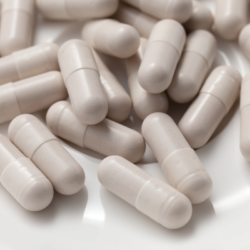Living longer is a universal wish. When it comes to longevity, we’re all looking for ways to achieve it. If you’re looking for that fountain of youth, you’ll be delighted to hear about berberine. But what exactly is berberine and how can it help us live longer? Let’s dive into this ocean of curiosities.
What is berberine?
Definition and origins
Berberine, a powerful plant alkaloid, has carved out a special place for itself in the field of natural health. Extracted mainly from plants such as Berberis vulgaris, this compound is traditionally renowned for its medicinal properties. Its history goes back thousands of years, and it has been used in many different cultures, particularly in Chinese and Ayurvedic medicine. What makes berberine so fascinating is its holistic approach to the treatment of various ailments. Its benefits are recognised in managing diabetes, treating infections and even improving cardiovascular health.
In 2024, interest in berberine intensified, not only in alternative medicine circles but also in scientific research. Its ability to interact with our bodies at a molecular level offers promising possibilities for the development of new therapies. The use of berberine, although deeply rooted in tradition, has been harmoniously integrated into modern medical practices, highlighting a fine example of the fusion between ancient wisdom and contemporary science.
Chemical composition
Chemically speaking, berberine is an isoquinoline alkaloid, a structure which gives it its unique bioactive properties. This distinctive feature enables berberine to act in a targeted way in the body. It interacts with cells and enzymes, influencing various metabolic processes. These interactions are at the heart of its effectiveness in treating and preventing conditions such ashyperglycaemia,hyperlipidaemia andinflammation.
Growing interest in the pharmacology of berberine has led to extensive research into its mechanism of action. These studies have revealed that berberine is not only effective, but also acts synergistically with other compounds and drugs, opening the door to more effective combination treatments. In 2024, this in-depth understanding of its chemical composition has enabled the development of formulations that are more effective and better absorbed by the body, maximising health benefits while minimising potential side effects.
History of berberine
Traditional use
Berberine has a rich history, marked by its use in various medicinal traditions around the world. Its use dates back thousands of years, mainly in Asia, where it was exploited for its medicinal virtues by practitioners of traditional Chinese and Ayurvedic medicine. Historically, berberine has been used to treat a wide range of ailments, including digestive disorders, infections and skin problems.
What sets berberine apart from other natural remedies is its multi-dimensional approach to health. It has been used not only as a direct treatment for specific ailments, but also as a general tonic to improve well-being and longevity. These traditional uses, based on centuries of observation and practice, have laid the foundations for berberine’s modern popularity and its inclusion in dietary supplements and health products.
Evolution up to 2024
The evolution of berberine up to 2024 is a fascinating testimony to the intersection of tradition and modern science. As scientific research progressed, berberine was gradually recognised in Western medicine for its potential therapeutic properties. Clinical and pharmacological studies have validated many of berberine’s traditional uses, in particular its beneficial effects in controlling type 2 diabetes, managing cholesterol and improving cardiovascular health.
In 2024, berberine became a subject of cutting-edge research, with studies exploring its potential in the treatment of more complex conditions, such as metabolic syndrome, certain cancers and neurodegenerative disorders. Research has also helped to optimise berberine’s efficacy, notably by improving its absorption and bioavailability in the human body.
What is longevity?
Longevity, a word that resonates in our minds with mystical brilliance, is the extended life span of an individual beyond the average life expectancy of their species. In the human context, it is the ability to live to a very old age, while maintaining good physical and mental health.
But longevity is not limited to lifespan. It is a concept that encompasses vitality, health and quality of life. It’s about living longer, of course, but it’s also about living better. Longevity aspires to a prolonged existence where the years are full of vigour and free from illness and weakness.
Berberine: a promising natural alternative in the quest for longevity
Berberine, an alkaloid extracted from various plants, is well known for its use in traditional Chinese and Indian medicine. Recently, it has attracted the attention of researchers for its impressive medicinal properties.
Why is berberine important?
This alkaloid has antibacterial, anti-inflammatory and, perhaps most importantly, anti-diabetic properties. It seems to work at a molecular level, with several studies suggesting that it activates an enzyme called AMPK, often regarded as a ‘metabolic switch’ in our bodies. You may be wondering, what does this have to do with longevity?
Berberine and longevity
It turns out that activating AMPK has anti-ageing effects. In fact, it appears to slow down the ageing process at a cellular level, a result that is incredibly promising for those of us in search of longevity.
The effectiveness of berberine in medical terms
Numerous studies have examined its effects on various medical conditions. It is particularly effective in the treatment of type 2 diabetes, with some research showing that it can be as effective as certain prescription drugs.
Berberine for diabetes management
Berberine appears to improve insulin sensitivity and promote glucose uptake into cells, making it a promising natural alternative for diabetes management. Berberine is a natural compound found in certain plants, includingbarberry,goldenseal and turmeric. It has long been used in traditional Chinese medicine to treat various health problems, including diabetes.
Several scientific studies have examined the effects of berberine on the management of type 2 diabetes, and the results are promising. Berberine appears to improve insulin sensitivity, enabling the body to better use glucose and regulate blood sugar levels. Berberine has also been associated with a reduction inglycated haemoglobin (HbA1c), a marker of long-term blood sugar control. Studies have shown that it can help reduce blood glucose levels on an empty stomach and after meals.
In addition, berberine can help reduce body weight, which is beneficial for people with type 2 diabetes, asobesity is often a risk factor. It may also have positive effects on blood lipids, reducing total cholesterol and triglyceride levels.
Berberine and cardiovascular disease
Berberine has also been shown to reduce LDL cholesterol and increase HDL, making it a potential agent in the management of cardiovascular disease.
Berberine: a resource for weight loss
Interestingly, this alkaloid may also aid weight loss. In fact, it appears to increase the production of adiponectin, a hormone that promotes weight loss.
How does berberine help weight loss?
Berberine is a bioactive compound found in several plants, widely studied for its various health benefits, including its potential to promote weight loss.
It is generally accepted that berberine stimulates the production ofadiponectin by activating a key enzyme,AMPK (Adenosine Monophosphate-Activated Protein Kinase). AMPK is often described as a ‘master switch’ of cellular metabolism, helping our bodies to maintain energy balance.
Adiponectin is a hormone produced by fat cells that plays a crucial role in regulating insulin and glucose metabolism. Higher levels of adiponectin have been associated with improved insulin sensitivity and a reduced risk of metabolic diseases. By increasing the production of adiponectin, berberine may therefore help to improve insulin sensitivity, a key factor in the regulation of body weight. Improved insulin sensitivity means that your body is more efficient at using glucose from your diet, thereby reducing blood sugar levels and facilitating weight loss.
It’s important to note that, although berberine can play a role in weight loss, it is most effective when combined with a balanced diet and exercise. Eating a healthy diet and exercising regularly are essential to maximise the potential weight-loss benefits of berberine.
Weight loss and longevity
Maintaining a healthy weight is essential for longevity. Berberine, with its weight-loss potential, can therefore contribute to a longer, healthier life.
The safety of berberine
As with any supplement, the safety of berberine needs to be considered. So, is berberine safe to use?
Is berberine safe?
Most studies suggest that berberine is generally well tolerated with short-term use. However, minor side effects have been reported, such as gastrointestinal disorders.
Dosage of berberine
The generally recommended dose of berberine is 900 to 1500 mg per day, divided into three doses. However, it is always best to consult a healthcare professional before starting any new supplement.
FAQ
1. Can berberine really prolong life?
It is still too early to say with certainty whether berberine can prolong human life. However, current research is very promising, showing that it can have a positive impact on various factors linked to longevity.
2. Where can I find berberine?
This alkaloid is found naturally in several plants, including barberry, goldenseal and Chinese coptis. It is also available in supplement form from many natural health product shops and online.
3. Can berberine replace prescription drugs?
This alkaloid should not be used as a substitute for prescription medication without the advice of a healthcare professional. Although it is promising, each individual is unique and has specific health needs.
4. What are the side effects of berberine?
Some minor side effects have been reported, such as gastrointestinal problems. It is always advisable to consult a healthcare professional before taking berberine.
5. Is berberine safe for everyone?
Although berberine is generally well tolerated, it may not be suitable for everyone. It is important to consult a healthcare professional before taking berberine.
6. How should I take berberine?
The generally recommended dose of berberine is 900 to 1500 mg per day, divided into three doses. However, it is always best to consult a healthcare professional before starting any new supplement.
Conclusion
Ultimately, berberine offers an exciting prospect in the quest for longevity. Its potential to help manage a variety of medical conditions. As well as its possible role in promoting longevity, makes it a natural alternative that deserves our attention.
However, as always, it’s crucial to remember that longevity is the result of a healthy lifestyle. A balanced diet, regular exercise and effective stress management are just as essential, if not more so. Berberine is one piece of the jigsaw, one that looks promising. However, it must be used with care and respect for our bodies.
References
- https://www.nad.com/news/berberine-cardiac-aging-anti-aging-protein
- https://www.ncbi.nlm.nih.gov/pmc/articles/PMC6974710/
- https://www.ncbi.nlm.nih.gov/pmc/articles/PMC5839379/
- https://www.quechoisir.org/actualite-complements-alimentaires-mise-en-garde-contre-la-berberine-n73683/
- https://www.sciencedirect.com/science/article/pii/S0753332223005437







